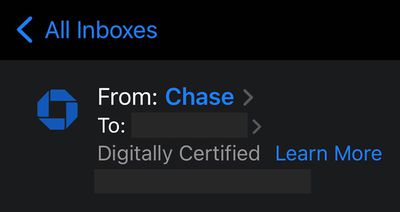iOS 16 and macOS Ventura Combat Email Spoofing With Support for Verified Brand Logos in Mail App
iOS 16 and macOS Ventura add support for the Brand Indicators for Message Identification (BIMI) standard in the Mail app, helping users to easily verify authenticated emails sent by brands by displaying the brand's logo alongside the email's header.

In the Mail app, emails sent by brands with a BIMI record are marked with a "Digitally Certified" label, which is visible after tapping to expand the email's header. Next to the label, a "Learn More" link leads to the following message: "This email was verified as coming from the owner of the logo shown and the domain [example.com.]"
For a brand's logo to be displayed, the sender's domain must pass DMARC authentication checks, according to the BIMI Group website. If the email passes authentication, the Mail app queries the DNS for a corresponding BIMI record.
Based on a tweet shared by software engineer Charlie Fish, it appears that Chase Bank is an example of a brand that has implemented BIMI, with the Chase logo appearing next to an email sent by the bank in the Mail app on iOS 16. BIMI is also supported by Gmail, Yahoo Mail, and Fastmail, according to BIMI Group.
This is just one of several new features added to the Mail app on iOS 16 and macOS Ventura, with others including the
ability to unsend an email up to 10 seconds after sending it, scheduled emails, notifications if you forget to include an attachment on an email, support for rich links in emails, improved search functionality, and more.
Popular Stories
Apple is planning to launch new MacBook Pro models as soon as early March, but if you can, this is one generation you should skip because there's something much better in the works.
We're waiting on 14-inch and 16-inch MacBook Pro models with M5 Pro and M5 Max chips, with few changes other than the processor upgrade. There won't be any tweaks to the design or the display, but later this...
Wednesday February 11, 2026 10:07 am PST by
Juli CloverApple today released iOS 26.3 and iPadOS 26.3, the latest updates to the iOS 26 and iPadOS 26 operating systems that came out in September. The new software comes almost two months after Apple released iOS 26.2 and iPadOS 26.2.
The new software can be downloaded on eligible iPhones and iPads over-the-air by going to Settings > General > Software Update.
According to Apple's release notes, ...
It has been a slow start to 2026 for Apple product launches, with only a new AirTag and a special Apple Watch band released so far. We are still waiting for MacBook Pro models with M5 Pro and M5 Max chips, the iPhone 17e, a lower-cost MacBook with an iPhone chip, long-rumored updates to the Apple TV and HomePod mini, and much more.
Apple is expected to release/update the following products...
Apple plans to announce the iPhone 17e on Thursday, February 19, according to Macwelt, the German equivalent of Macworld.
The report said the iPhone 17e will be announced in a press release on the Apple Newsroom website, so do not expect an event for this device specifically.
The iPhone 17e will be a spec-bumped successor to the iPhone 16e. Rumors claim the device will have four key...
Apple acquired Canadian graph database company Kuzu last year, it has emerged.
The acquisition, spotted by AppleInsider, was completed in October 2025 for an undisclosed sum. The company's website was subsequently taken down and its Github repository was archived, as is commonplace for Apple acquisitions.
Kuzu was "an embedded graph database built for query speed, scalability, and easy of ...





















